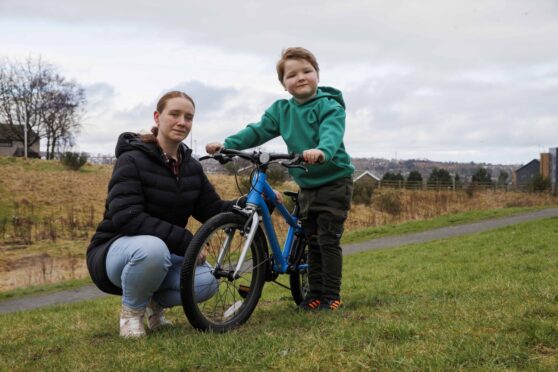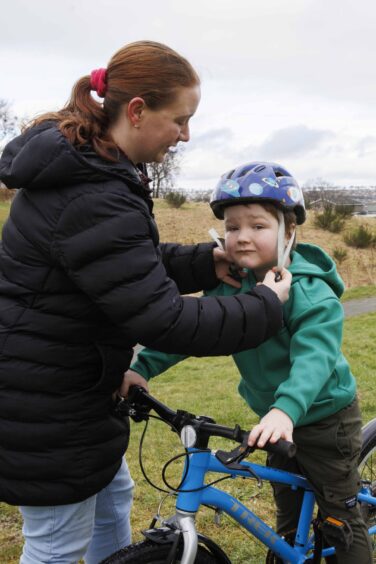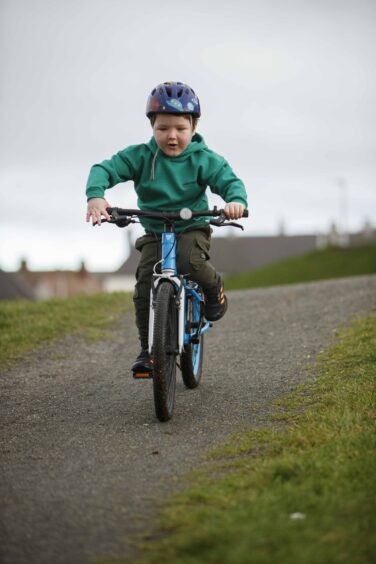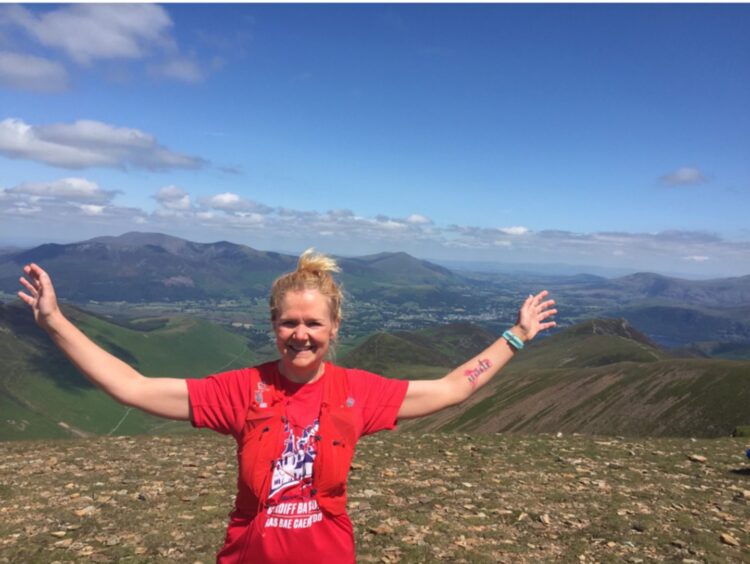
An adorable seven-year-old is cycling his way back to health with a new bike.
Hunter Pirie was diagnosed with leukaemia after developing exhaustion and leg pains while playing with friends at his home in Peterhead.
He was referred to the Aberdeen Children’s Hospital where blood tests revealed the cancer, and was started on two-year long chemo treatment.
“In the months during the chemo our lovely son would watch from the window as his friends played outside on their bikes, desperately wishing he was with them,” said his mum, Kelly.
“But he was too tired and exhausted with the side-effects of chemo to join them. But now he can and he is loving every minute of it.
“Childhood cancer sorely tests any child and their family. There were times when he was kept in isolation for days because his immune system was weakened by the treatment and he risked dying from a simple infection.”
She added that although childhood cancers are rare, they affect almost 2,000 children every year in this country.
“Diagnosis is not always immediate.
“It took at least three visits to our doctors to get the leukaemia identified and we believe a greater awareness is desperately needed.
“Hunter’s treatment and care since then has been excellent.”
Happiest on two wheels
Now he’s feeling well enough to cycle and is at his happiest on two wheels at the moment.
The new bike was one of many donated to children like Hunter by the charity Cyclists Fighting Cancer (CFC).
“His face lit up when he put on his helmet and cycled off. That was a magic moment for us as parents when we are watching him go through chemo,” Kelly said.
Hunter is half-way through his treatment, backed by research which suggests that exercise helps recovery.
The Children’s Cancer and Leukaemia Group charity says regular exercise releases hormones called endorphins, which contribute to a feelgood factor.
“For children and young people with cancer, whose lives have been turned upside down by their diagnosis, and who may have spent long periods in hospital, this can be very beneficial,” it says.
It adds that it can improve good sleep patterns and decrease pain while improving appetite, all vital to children with cancer.
CFC say: “Helping children recover from cancer is a huge part of our mission to help.
“Our reward is seeing the smiles on their faces when the bikes arrive at their homes. We help children all over the UK.
“Some of our supporters have been cancer patients who are finding recovery assisted by their love of cycling.”
CFC trustee Dr Dannie Seddon, a children’s anaesthetist, said: “Helping CFC support these children and their families is such a privilege.”
Around 1,900 children are diagnosed with cancer in the UK every year.
It is spread across 76 types of children’s cancer classified into 12 main groups.
Leukaemia is the most common form of paediatric cancer, followed by brain and spinal cord tumours.
I’ve been through anxiety of a diagnosis, the biopsy and waiting for results
A doctor who works with children undergoing treatment for cancer has spoken of her own challenges in overcoming the disease.
Paediatric anaesthetist Dannie Seddon works at the Royal Hospital for Children in Glasgow and was diagnosed with breast cancer.
Dannie said: “I have been through the anxiety of having a cancer diagnosis, undergoing a biopsy and the limbo of waiting for results all as a patient of the NHS.
“But it is vital to be completely open about cancer because is it so common.”
A pink ribboned tattoo on her left arm is one she wears with pride.
She said: “I work with children every day and see the devastation that a cancer diagnosis brings.
“I am inspired and humbled by their stoicism while undergoing cancer treatment, when it is often unpleasant and scary.
“The whole team looking after them work hard to limit any distress the children experience.”
She explains how she coped with the inevitable feelings of fear and isolation which the disease can give patients. She said: “When a breast cancer specialist tells you that you the biopsy is positive for cancer and that it has spread to your lymph nodes it is normal to worry about what lies ahead.
“You begin to experience the NHS as a patient, the anxious wait for test results, clinics and treatment.
“I found it easier to accept breast cancer, more so than other patients who have less treatable cancers. That’s because breast cancer has a greater survival rate than many.”
She had six months’ sick leave for treatment and returned to work as soon as it had finished.
Her love of cycling has been a route to recovery. She said: “All the evidence seems to point to exercise as valuable in helping to prevent and recover from cancer.
“It begs the question: why I got cancer at 40? Well, breast cancer is very common, and you have to accept that you may well develop it or another cancer in your lifetime.
“I don’t feel angry but instead knew that accepting it and trying to be positive about treatment and recovery worked best for me.”
One in seven women will get a breast cancer diagnosis in their lifetime, according to Cancer Research UK.
Today Dannie is a trustee for Cyclists Fighting Cancer which supports children and families by providing bikes to them and their siblings.
This can range from a standard bicycle to one that has been specially adapted.
Part of her charity role involves delivering bikes to children recovering from childhood cancer in Scotland. She said: “This has taken me and my husband Rhys, a fellow paediatric anaesthetist, to some lovely rural places in Scotland.
“It’s honestly all about the children, seeing their faces light up when we unload their new bikes from the back of the van.”

Enjoy the convenience of having The Sunday Post delivered as a digital ePaper straight to your smartphone, tablet or computer.
Subscribe for only £5.49 a month and enjoy all the benefits of the printed paper as a digital replica.
Subscribe © Ross Johnston/Newsline media
© Ross Johnston/Newsline media © Ross Johnston/Newsline media
© Ross Johnston/Newsline media